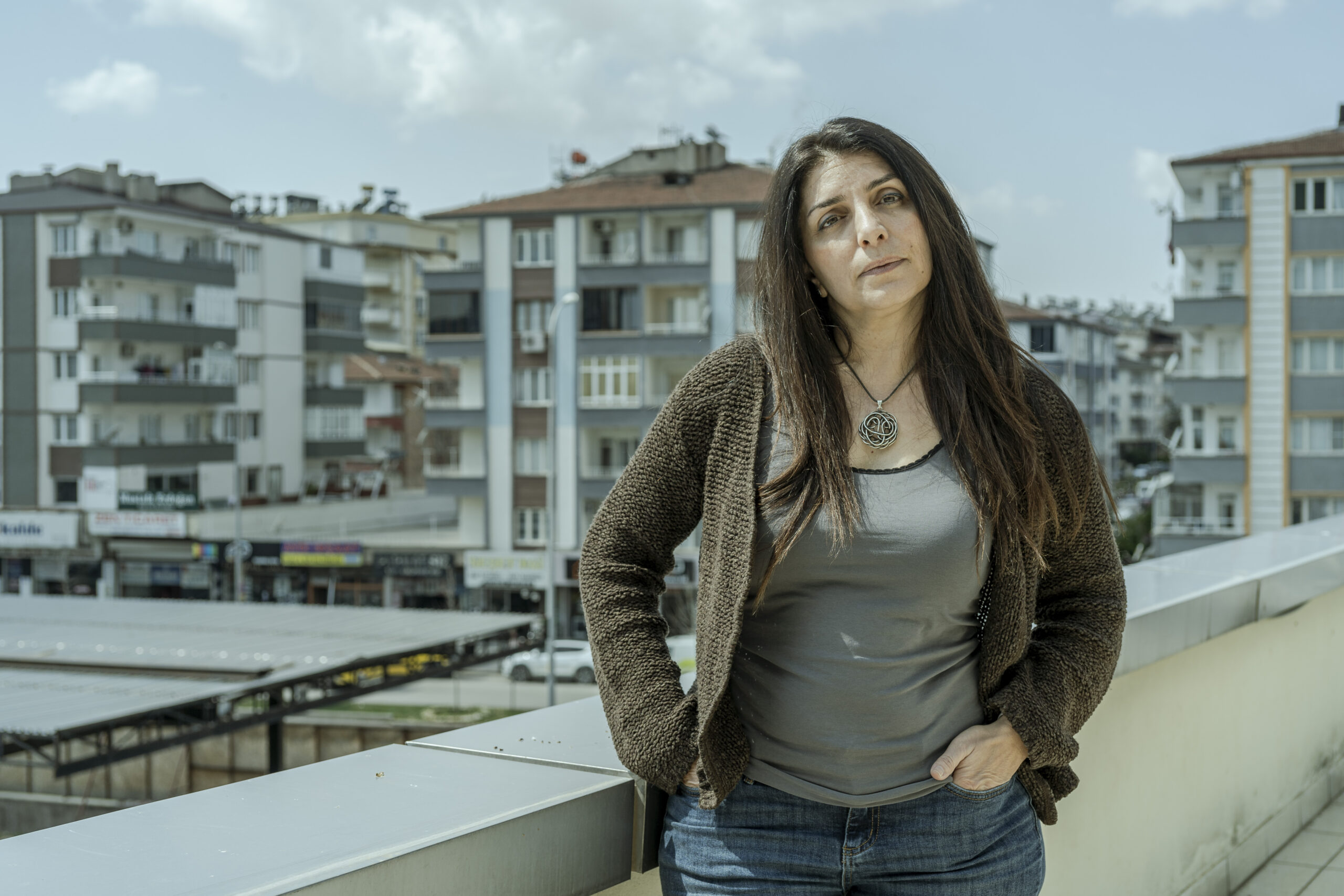The outdoor tables of Kafka Kültür Internet Cafe are covered with piles of empty teacups and ashtrays full of half-smoked cigarettes.
Several customers sit and open their laptops, while the chattering and gentle sounds of typing on keyboards and phones vibrating make it almost look like a newsroom.
Despite its Turkish name, many Syrian journalists in Gaziantep know the place by its Arabic nickname Ayen Amak — the name of a popular cafe in the province of Idlib, the last-standing area in Syria not controlled by the Assad regime. The two cafes are similar, sharing the same atmosphere, drink menu, and outside view on a bustling shopping street.
It’s here that almost every day Abedalbaset al-Hasan spends several hours working on his video reports for Syria TV, a popular Syrian news channel employing more than 200 journalists and reaching an audience of four million daily, now headquartered in Turkey.
“I didn’t have anyone to teach me , but in Gaziantep there is a community where we all teach and learn from each other,” says Abedalbaset al-Hasan, 27, as he sips his third cup of Turkish çay of the day while editing some segments about the recent earthquake that struck Turkey on Adobe Premiere.
It’s thanks to the connections he made at this cafe that about 18 months ago he found his current job as cameraman and began covering Syrian social issues like the conditions in refugee camps and economic struggles of displaced Syrian citizens from the relative safety of Turkey.
Reporters Without Borders reports that hundreds of Syrian journalists have been killed and harassed by the Assad regime and armed groups since the beginning of the conflict in 2011. According to the Syrian Journalists Association, which has more than 300 members, only a handful of them still operate in Syria, one of the most dangerous countries in the world for this profession.
In its latest press freedom report, Reporters Without Borders (RSF) ranked Syria 175th out of 180 countries in the world for press freedom. Many — if not most — of the media outlets in Syria are controlled by the Assad regime and the ruling Baath party, and journalists are subject to prosecution under a new cybercrime law that prohibits, “spreading false news online that damages the prestige of the nation,” according to RSF. Just last year, the organization reported that in Syria three journalists were killed and 24 journalists and two media workers were imprisoned.
Because of these dire conditions, independent Syrian journalists have fled their home country, many escaping to Turkey because of the close proximity and what at first was a relatively welcoming reception from the Turkish government. These journalists are providing crucial, independent reporting on everything from the Syrian civil war to Covid-19 precautions to the mental health issues affecting refugees. Their coverage has been instrumental in helping both local and Western audiences to understand the plight of the Syrian people at a time when the country and region are regressing in terms of press freedom.
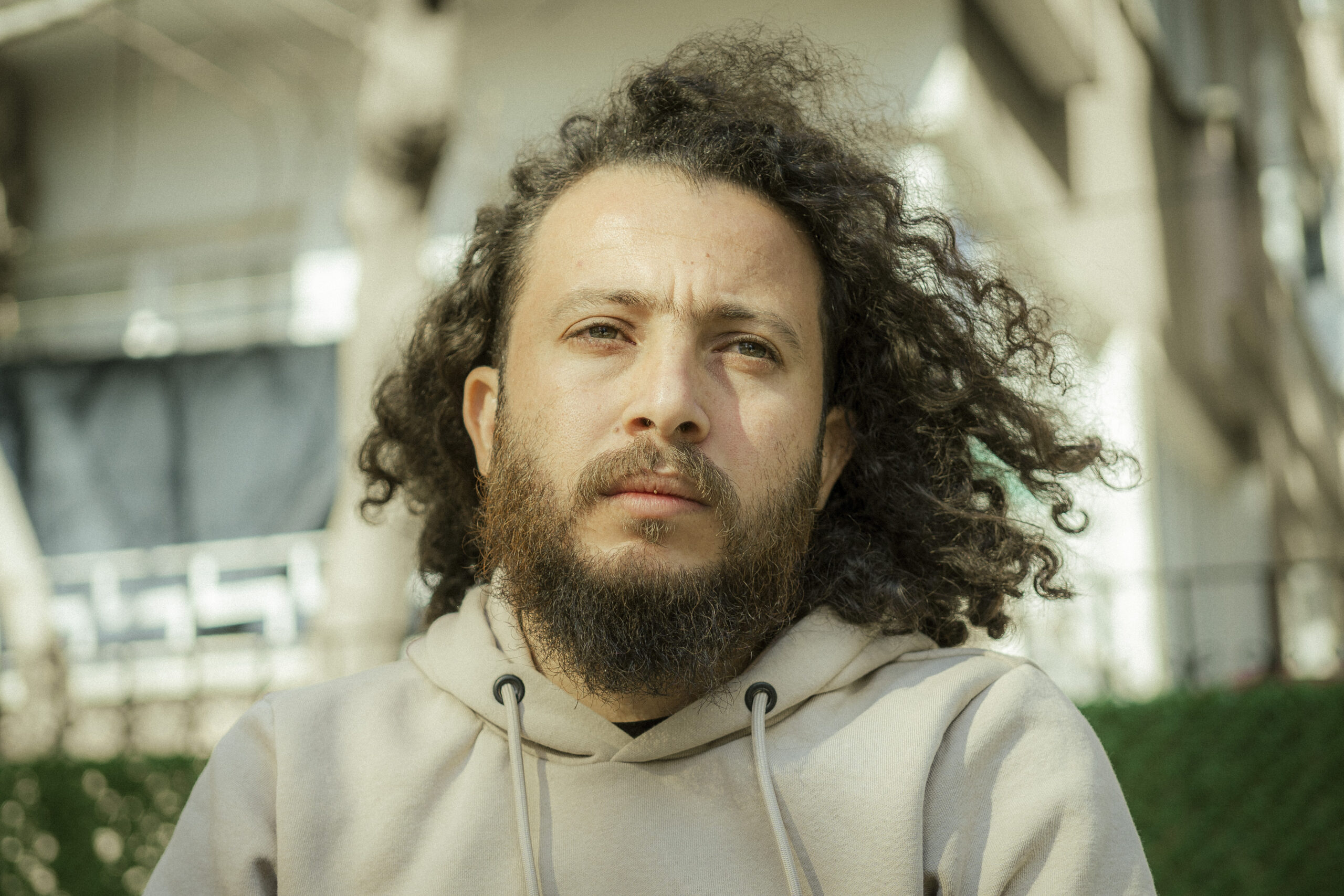
Abdulsalam Jarroud
When the border closed for the majority of civilians, people in Syria accessed this journalism online and tuned into radio broadcasts, if they lived close enough. For newspapers, it was even more complicated. Five outlets, including Koulouna Sourioun, one of the first post-revolution, independent Syrian newspapers, and Enab Baladi, a nonprofit print and online newspaper focusing on peaceful resistance stories, created a network in Gaziantep that printed the papers and transported them to Syria for distribution — a risky endeavor that could wind someone up in prison or worse.
Although Turkey also scores dramatically low in terms of worldwide press freedom standards (more than 90 journalists and media workers have been detained there since 2018), it is estimated that hundreds of Syrian journalists have crossed the border into Turkey in the past 12 years and begun working remotely, often as freelancers for international outlets. Within Turkey, Gaziantep — a city at the crossroads of the Middle East — has become the media capital of Syria with the blessing of the Turkish authorities. Over the last decade, about a dozen radio stations and a dozen Syrian exile-led newspapers have taken root here, according to officials at the French Agency for Media Cooperation (CFI), a French media development institute. Syrian journalists are attracted to the city because of the cheaper costs compared to Istanbul, its closer proximity to Syria, and the already high number of Syrian residents.
That’s not to say there haven’t been challenges for Syrian journalists operating in Gaziantep. Many are fearful that President Recep Tayyip Erdogan, who won another five-year term in late May, will follow through on his campaign promise to deport one million Syrians, a platform that has fueled the harassment of Syrian refugees. The Turkish authorities have done little to quell the unrest, and journalists have often been the targets of these attacks.
In March, Ahmad Rihawi, an anchor for Orient News TV, and Alaa Farhat, the channel’s director, were arrested in Istanbul after a Turkish political analyst went on a racist tirade on air and ripped up Rihawi’s notes. (They were released two days later.) Two Syrian journalists in Turkey were detained in January for deportation, at least one of whom was beaten, according to RSF, and others worry about a similar fate. The bureaucratic hurdles — including having to register a news outlet as a production company and the complicated paths to receive work permits for staff that are often withheld for political purposes — are another challenge that Syrians in Turkey have learned to navigate.
“We just need a safe space where to publish our news,” says Osama Aghi, founder of Ninar Press, an online weekly that covers political news about Syria and is based in Gaziantep. “It’s important to give an opportunity to Syrian journalists to find a [physical] space where to freely report and publish their stories.”
Situated in southeastern Turkey, less than 150 kilometers from Aleppo — one of the cities most impacted by the Syrian conflict — Gaziantep was near the epicenter of the Feb. 6 earthquake that killed more than 50,000 people in Turkey. The earthquake has tested an already unstable situation for journalists, some of whom have been detained for reporting on the aftermath of the tragedy. From his little table at Kafka, al-Hasan confesses his worries.“Lately, I feel that even in Gaziantep it’s becoming harder to be a Syrian reporter,” he says. “I feel there still are some boundaries and I cannot deliver the full story or do investigations on our conditions in the country.” Most stories about deportation threats and Syrian child labor exploitation are reported by foreign journalists and outlets, or by Syrian journalists working as staff for them and who can benefit from Western protection. It’s also risky for them to cover Turkish politics, as was the case over the past few months as the country geared up for its presidential election.
But still, the Syrian newsrooms that were forced to close their offices for a few weeks after the earthquake kept operating with their staff working from home or from the few open cafes amid the rubble, similar to the times many Syrian journalists worked under shelling during the war.
Gaziantep has always carried a dual identity. It used to be part of the Ottoman Empire, and today — particularly after a decade of conflict and refugee crisis — bilingual street signs, shops with both Turkish and Arabic products, and Syrian and Turkish restaurants standing next to each other fill the narrow streets that are reminiscent of the old Aleppo city. Today half a million Syrians live here, and since the beginning of the Syrian crisis, the city has become a major humanitarian aid hub as well as a flourishing place for intellectuals, writers, and activists.
In Gaziantep, despite the challenges, Syrian exiles have a wide variety of media to choose from across radio, television, print, and digital, including even a magazine for children. This is what pushed Aghi — a writer and activist who spent nearly a decade in regime prison between the 1980s and early 90s for opposing the government — to launch Ninar in 2020.
“In Syria there was no free press before 2011,” explains the 69-year-old Aghi. “We were not allowed to publish anything even slightly controversial.” In the last three years Ninar has covered human rights, feminism, and local Syrian politics. “We noticed there was especially a lack of gender-related stories, so we decided to focus much of our reporting on that,” Aghi says. That helped many of their female readers to better understand their rights, he adds.
Today Ninar has a staff of six, plus a dozen freelancers, many of whom are in Syria, mainly in the northern areas where it’s still safer to report. In Damascus, he says, it’s too risky to keep correspondents. The Gaziantep newsroom, located in the quiet, residential area of Gazimuhtar Pasa, is a simple two-room space with just a few desks and chairs, and a tray always full of Syrian biscuits and freshly-made coffee.
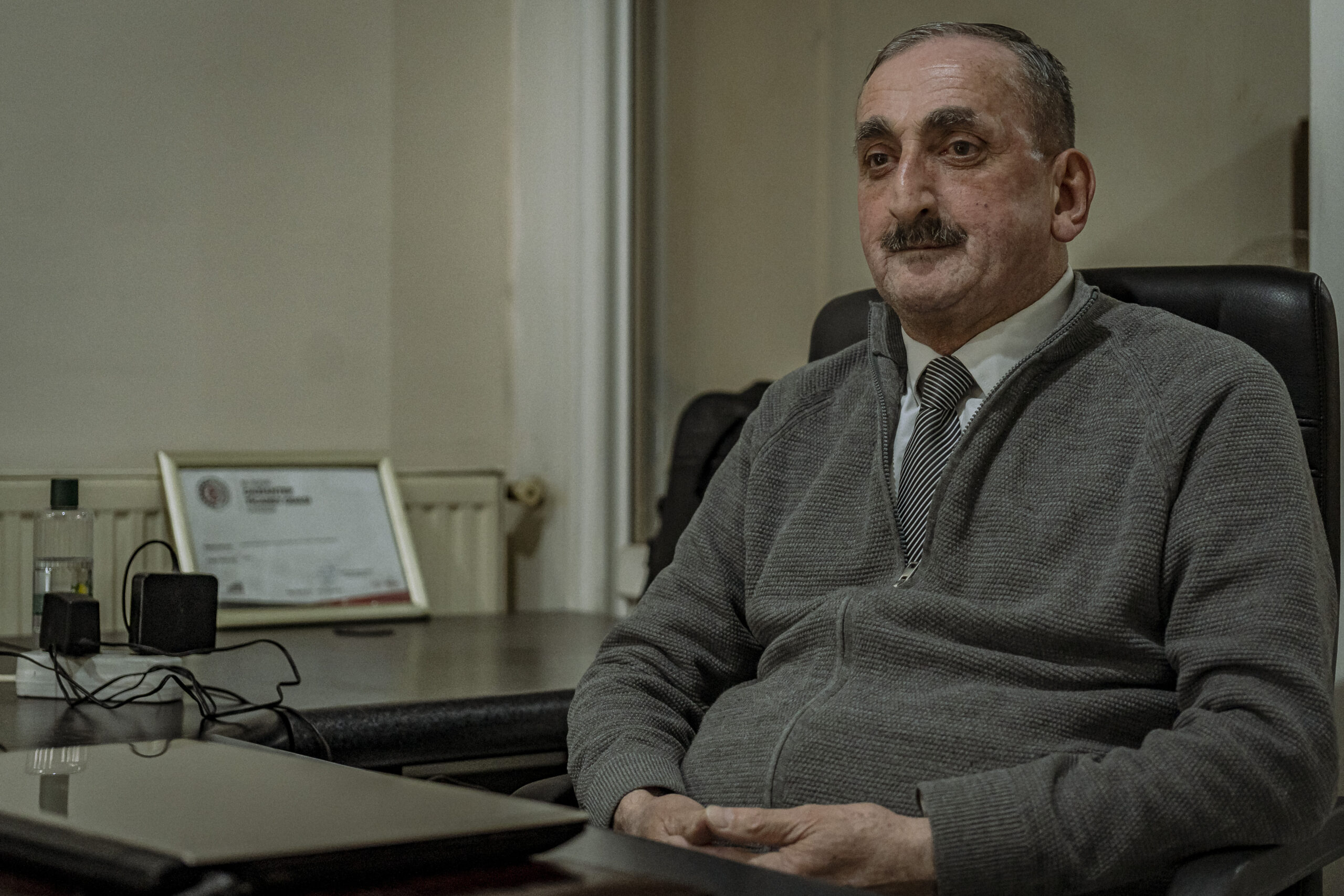
Abdulsalam Jarroud
“This was the best possible place to create something like this, because it’s like a new Syria, the one we hoped to create back home, but couldn’t,” says Aghi, who fled his home country after the Assad regime and armed groups began threatening his life because of his reporting on ISIS.
For those still operating in Syria, using fake names to protect identities is a common practice. Aghi says he receives reports from Syria from reporters whose identity he knows but publishes the stories using fake names to protect their identities. When paying contributors, he uses cash so that authorities are not able to trace the money back to Ninar. Although the website has reached so far just a few thousand readers each day, both from Syria and abroad, he says he’s happy with how far they’ve come.
A handful of television stations have also relocated here — mostly small-scale newsrooms streaming online through YouTube and Facebook channels — but there are also a couple broadcasting through satellite signals.
Aleppo Today, which originally broadcasted from Aleppo, moved its operations to Gaziantep after its anti-regime rhetoric made it too risky for them to keep operating inside Syria. The station, which broadcasts over satellite and streams online, covers issues like the migrant situation on the Evros river where many Syrians trying to cross illegally into the European Union have been stuck for extended periods of time because of border patrols, leading sometimes to their expulsion back to Turkey or even their death. One of their reports sounded the alarm regarding about 44 Syrians, including women and infants, who had been stuck for two months on an island between Turkey and Greece. After speaking to them and asking them for videos to confirm their story, Aleppo Today geo-located their exact location and contacted human rights organizations, which then led to their rescue.
Ibrahim al-Sabagh, 33, is originally from Damascus and moved to Gaziantep in 2013. When he arrived, he started working as a reporter, first at Radio Hara FM, another Syrian radio station that moved its offices to Gaziantep right after the conflict began. Sabagh was hired in 2016 by Aleppo Today, where he started as an assistant producer for several of its programs. Today, he’s the channel’s news director, overseeing a staff of about two dozen people. “It was a way to put my skills to the service of my country, keep the connection to my homeland and contribute to informing my fellow people back home, as well as my community here in Turkey,” he says of his work.
One of the most important programs at Aleppo Today Sabagh says he’s worked on is “Sautik Bigaieer” (Your voice changes reality), which presents profiles of Syrian women who need help and connects them with those who can provide support, such as non-governmental organizations, government agencies, or influencers. “We have found solutions to difficult problems for many Syrian women — legal problems, health problems, and even family problems,” he says. One episode about a woman with an amputated foot resulted in a team of volunteers giving her an electric wheelchair and new furniture.
Sabagh says it’s reports like these that allow reporters to feel a connection to the Syrian people and help them appreciate their mission. Part of their airtime is dedicated to entertainment and lifestyle pieces because he believes that journalists not only should give voice to a community’s hopes and expose its problems, but they also have a duty to report on more positive trends about refugee integration through business success stories and how Syrians contribute to improve Turkish society. These types of stories, he adds, are easier to deliver given the threat of deportations.
Lina Chawaf was relieved when in 2013 she moved the staff of the outlet she helped launch, Radio Rozana, from Syria to Gaziantep. Rozana was born amid the early days of the revolution as one of the few independent radio channels; at first, its reporters would move back and forth across the border between Syria and Turkey, but when Turkish authorities closed it, and with heightened threats from the Syrian regime, the staff moved permanently to its current headquarters in Gaziantep, though a few administrators are based in Paris.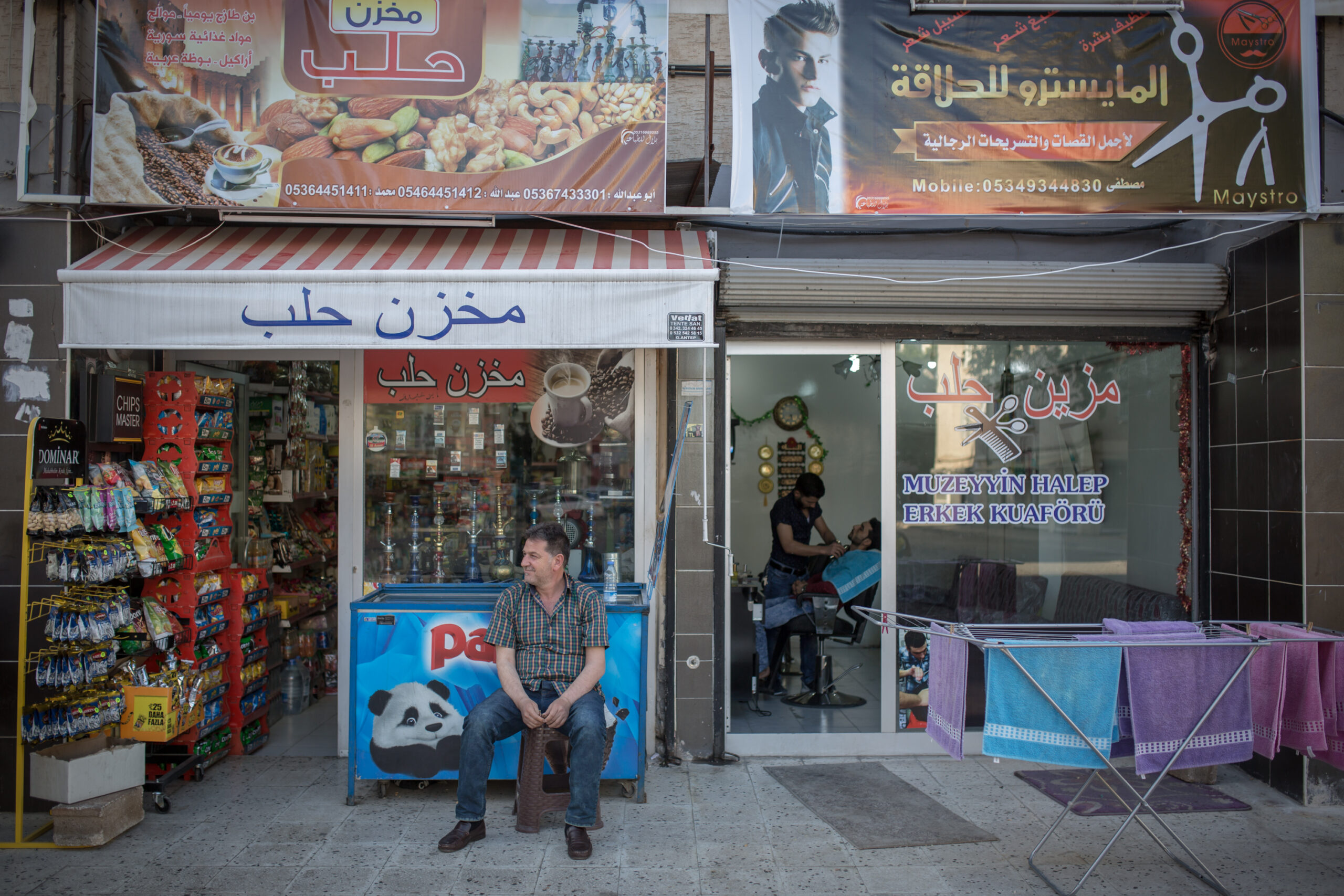
Uygar Onder Simsek/picture-alliance/dpa/AP Images
“Here we don’t have too much control from Turkish authorities on our content,” she explains from her 15-person newsroom with two aquamarine-walled broadcast booths and linoleum floors located on the second floor of a recently restored building, just a few blocks from Ninar Press. Although she recognizes Turkey’s very own fault lines on press freedom issues and the limits they have as Syrians to cover certain topics, “it’s definitely a big improvement compared to what we would face if we were to still be based in Syria.”
In Gaziantep, journalists also have more access to humanitarian workers and agencies, making it easier to be a watchdog of Syrian NGOs, says Chawaf.
Chawaf, a media consultant who’s helped launch five radio stations in Arab Spring countries like Libya and Yemen, helped train dozens of citizen journalists to become independent reporters inside Syria and later hired them to work at Rozana.
She trained them to cover conflict and corruption in emergency situations, which was useful when covering Covid-19 and the earthquake in February, she says.
By the end of 2014, the radio built a network of over two dozen correspondents who would go back and forth between Syria and Turkey. Those in Syria would send their reporting to the newsroom in Turkey through encryption software, Skype, fake Facebook accounts, or chats that they erased so as not to leave any trace. The reporting was then produced and edited in Gaziantep and streamed and broadcast via FM radio to reach its audience of about 10 million online listeners and millions over the airwaves — 60 percent of which lives in Syria and Turkey. The station has covered stories like domestic abuse cases among Syrian families in Turkey and the environmental impact caused by the armed conflict and weapons on Syria’s agricultural lands, trees, and soil. Rozana also translates its work into English to help Western audiences understand the reality of the upheaval in Syria.
Apart from being Rozana’s executive director, Chawaf also has her own program called “Stigma,” which explores mental health and abuse issues in the wider Middle East. The podcast, which has 15 episodes, has helped individuals find the support they need. For example, the program assisted a woman realize that she was the victim of domestic violence from a bipolar partner and connected her withthe right lawyers to receive legal assistance.The woman later joined Rozana as a staff journalist.
“Listeners don’t want to hear about politics anymore. They want programs about everyday needs, like how to live in Turkey and access services,” explains Chawaf. “That’s why we focus on a solution journalism approach.”
What Syrian journalists hope to achieve in Gaziantep is the impact they wouldn’t otherwise be able to achieve back home. Nezhat Shaheen, a producer at Syria TV for the past four years, says that there are many stories that focus attention on the conflict in Syria — namely migration stories on the Turkish-Greek border and the recent earthquake — but those are tragedies. The collective goal of Syrian journalists in Gaziantep is to show a different side of the mainstream narrative.
“In the last two years, I started focusing on the success stories of Syrians in all countries of the world and showing the bright side of their lives away from war,” he explains. Today apart from broadcasting via satellite, Syria TV has found a wider audience through social media, with its Facebook livestreams reaching seven million people daily. Its digital platform, Syria Stream, launched in 2019 and has gained followers among Syrians both inside and outside the country, as well as wider Arab audiences. The outlet’s focus is on positive stories about the revolution, backed by the channel’s most popular show “I was a witness,” a program dedicated to telling the stories of the political activists putting their lives on the line in Syria.
The Syrian press has been financially struggling over the past few years, as attention shifted away from the civil war and its aftermath, and funds for the outlets in Gaziantep have overall been shrinking, according to many of the journalists interviewed for this story.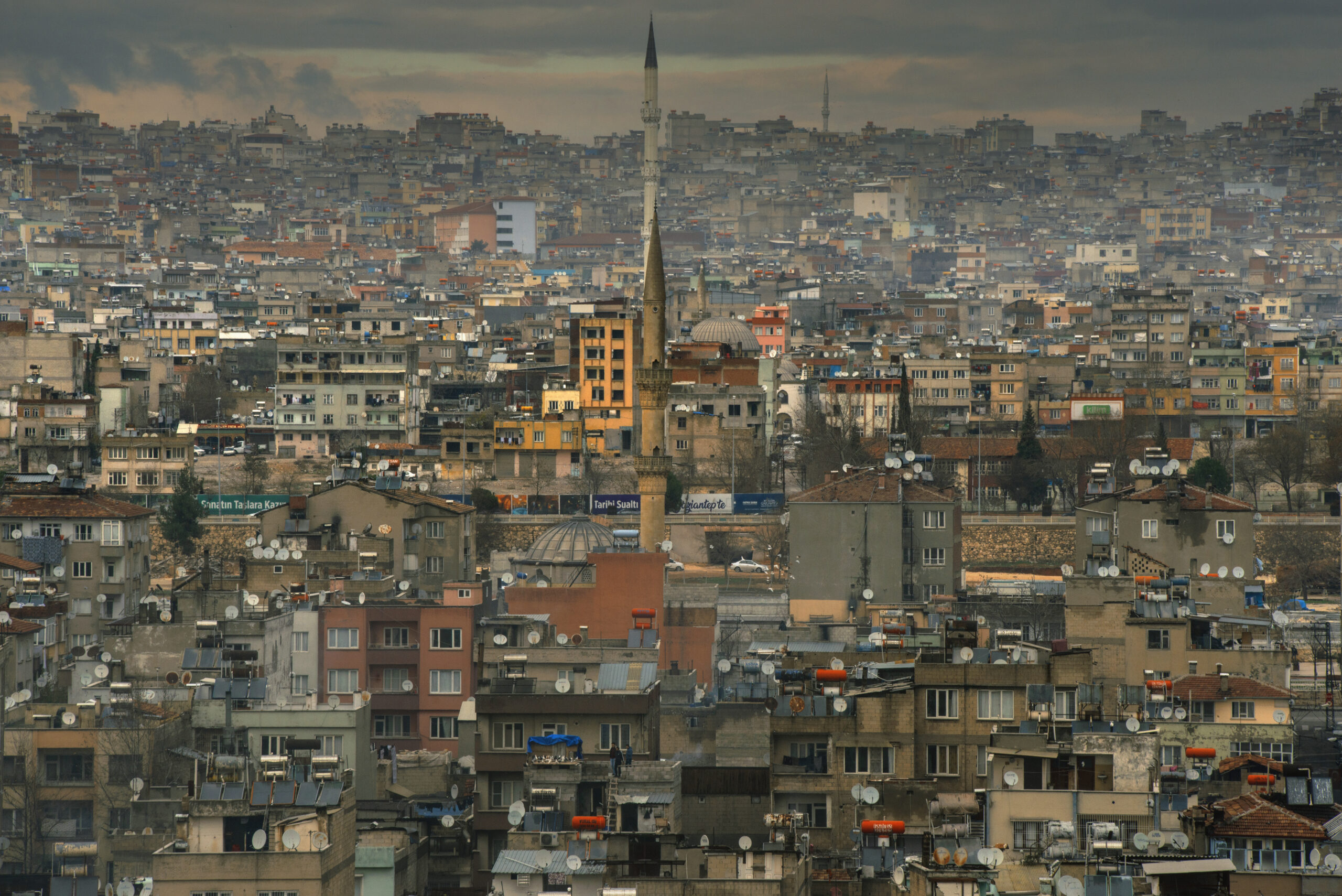
Jadwiga Figula/Getty Images
Each newsroom relies on a different business model to make ends meet. Channels like Syria TV and Aleppo Today are funded by private owners (a Qatari company and an anonymous anti-Assad Syrian businessman, respectively) while others — like Radio Rozana — prefer to apply for funds and grants from NGOs and European institutes to maintain transparency. “Having an owner often means you have to give up on a degree of freedom,” Chawaf says. “We want to be an objective, non-partisan outlet that follows Western standards of press freedom.”
Aleppo Today is affiliated and backed by Syrian opposition forces, and its reporting clearly has anti-regime tones.
Others like Ninar Press have had to come to terms with the lack of funds, and rely on donations from Syrian expats in Europe and the U.S. “Many of our journalists work on a voluntary basis, including me,” Aghi says. “As we opened in 2020, when Covid hit, interest on Syria was at an all-time low. We didn’t have much luck applying for grants.”
The majority of his staff have second jobs. Aghi works as a researcher for think tanks, but that was the compromise he made to stay afloat and join the effort to contribute to a free Syrian press. Despite not receiving money for his role as editor-in-chief, he sees it as a mission, both for himself and the Syrian cause.
“Of course, there’s no press freedom like Europe,” he says. “But no one here bothers Syrians specifically for what we report on, and that’s more than enough.”


